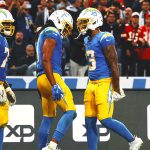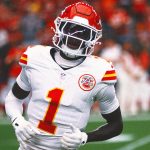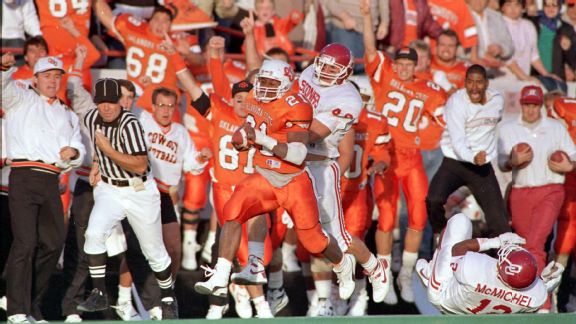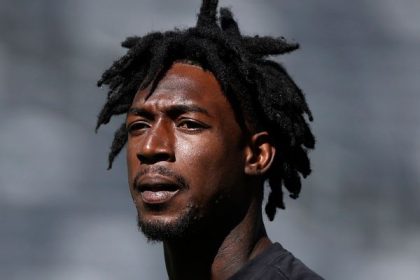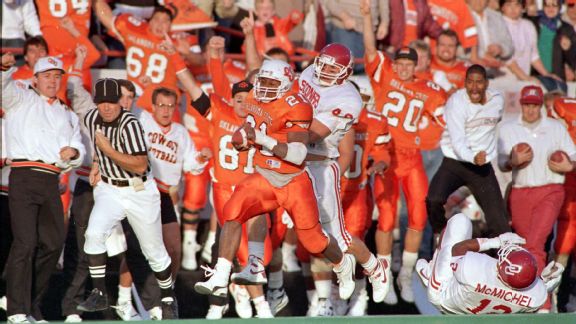
College football gives us different types of rivalries. There’s the matchup of bluebloods, the games that have pretty reliably played roles in title races through the decades — games like Michigan-Ohio State, Oklahoma-Texas or, back in the day, Oklahoma-Nebraska or Florida State-Miami. There are the countless middleweight rivalries between local teams that recruit against each other, think about one another constantly, grow to hate each other with a passion and use a win over said rival as the No. 1 determinant of a successful season. Think of Minnesota-Wisconsin (tied at 62-62-8 all time) or, in another lifetime, Missouri-Kansas (57-54-9 Mizzou).
Then there are the lopsided and inconsistent rivalries, the ones involving a big dog and a really annoyed neighbor. There are quite a few blowouts in this type of series, and the big dog likely holds a huge lead in the all-time series. But when these games do pop, they pop louder than any others.
These are the games we could be losing in next year’s round of conference realignment. Oregon has gone 35-12-1 over its past 48 games against Oregon State, for instance, but the Ducks’ losses in 2020 and 2022 (and their win in 2013) were among the best games of the past decade. And in the Apple Cup, Washington leads rival Washington State by a 75-33-6 margin, but every Wazzu win, from 2021’s 40-13 blowout to 2008’s classic 16-13 victory that capped a 0-12 Washington season, has been incredibly memorable. With Oregon and Washington leaving for the Big Ten next year and leaving their in-state rivals behind, it’s unclear when or how frequently these incredible rivalry games will be played again.
Bedlam, the annual battle between Oklahoma and Oklahoma State, is the ultimate example in this category. OU leads the all-time series 91-19-7 and has won by two or more touchdowns 10 times in the past 20 years alone. But the other 10 games in that span were frequently epic, from overtime battles in 2012 and 2014 to track meets with scores like 61-41 in 2008, 47-41 in 2010 and 62-52 in 2017. Twist endings have been relatively frequent since OSU got up and running under Mike Gundy in 2008.
On Saturday, these historic rivals will play each other for the last time for the foreseeable future. OU is departing for the SEC, and Gundy and OSU don’t have any immediate interest in continuing the series. They will inevitably play again one day once openings show up on future schedules and annoyed feelings subside. But for now let’s take a big gulp of a Braum’s limeade, order some Eskimo Joe’s cheese fries and commemorate yet another disappearing rivalry. Let’s look at 10 games that have defined Bedlam.
1904: Oklahoma 75, Oklahoma A&M 0
This was the first meeting between what would become OU and OSU, which was known as the Oklahoma A&M Aggies until 1957. It might have been the greatest tone-setter possible for any rivalry. For one thing, OU won handily. For another, it produced one of the most chaotic games in the sport’s history.
Amid cold and breezy conditions, an Oklahoma A&M punter, standing near his goal line, punted a ball that got caught in the wind and blown backwards and away from the field. As documented by Charles F. Long in Sooner Magazine, “This was obviously a loose ball, and in those days it meant something. The rules specified that if the kicking team recovered it, then it was a touchback. If the other team got to it first, a touchdown would be scored for it. Both players and crowd went wild. Both scampered off the field, following the ball. When the ball landed it didn’t stop. Down an incline it went and right into the waters of Cottonwood Creek.” Players from both teams charged after the ball. “Delighted spectators stood on shore cheering and laughing,” the story continued. “The aquacade increased in size. Three other players ran into the water, and, finally, Ed Cook captured the ball, struck out for the bank and shiveringly touched it down there for a touchdown.'”
We need to bring back creeks and out-of-the-stadium ball chases.
1958: No. 3 Oklahoma 7, Oklahoma State 0
OU dominated the early games in the rivalry, but the Aggies struck back, winning five games with three ties from 1924 to 1933. The Aggies won by a combined 75-6 in 1944 and 1945, too, claiming a share of the national title in the latter season. But in 1946, the rivalry’s momentum changed back to the Sooners for good. OU hired Hall of Famer Jim Tatum for one year, and when Tatum left for Maryland, the Sooners replaced him with a young coach named Bud Wilkinson.
OU won 19 straight in the rivalry. From 1946 to 1957, the average score was Sooners 42, Aggies 7. But in 1958, with Wilkinson’s run of national dominance nearing its end, OSU nearly pulled a stunner. In front of 40,000 in what the Daily Oklahoman’s Volney Meece called a “bruising, goo-covered 7-0 decision” in muddy Stillwater, Bobby Boyd raced 31 yards for the game’s only score with about five minutes left. It was a missed opportunity for the Cowboys, who would beat Florida State in the Bluegrass Bowl a couple of weeks later to finish 8-3. They would have to wait another seven years to finally take down the Sooners again — they won back-to-back one-point games in 1965 (17-16) and 1966 (15-14).
1976: Oklahoma State 31, No. 5 Oklahoma 24
OU was vulnerable over the back half of the 1960s, and the Cowboys nearly scored another win in 1969, falling 28-27. But once the Sooners had copied (and mastered) Texas’ wishbone offense in the early-1970s, Bedlam grew far less crazy. Between 1970 and 1981, OU won 11 of 12 meetings by at least 20 points, four by at least 44.
When the Cowboys got a shot at an upset in Norman in 1976, however, they took full advantage. Terry Miller rushed for a career-high 159 yards, the OSU defense held OU to just 68 total yards in the second half, and down 24-13 with seven minutes left, the Pokes scored twice to shock the unbeaten Sooners. They were so stunned, in fact, that they lost to Colorado the next week as well, before rallying to finish 9-2-1. In 1977, however, order was restored with a 61-28 OU win.
1983: No. 15 Oklahoma 21, Oklahoma State 20
OU’s consistent post-war brilliance has obviously played a large role in Bedlam’s one-sidedness, but OSU’s own inconsistency has been a factor, too. Between 1945 and 1983, the Cowboys finished ranked just twice — in 1958 and 1976 — and were rarely up for a challenge this stiff. That began to change when first Jimmy Johnson and then Pat Jones took over in Stillwater. After going just 21-21-3 over his first four seasons, Johnson rode an otherworldly defense to a solid, 8-4 breakthrough in 1983.
After a 4-0 start, the Pokes nearly beat an otherwise untouchable Nebraska team, falling 14-10, then took a 20-3 lead into the final 10 minutes against OU. But Derrick Shepard scored on a 73-yard touchdown pass from Danny Bradley, Spencer Tillman scored to get the Sooners to within 20-18, and after OU recovered an onside kick, Tim Lasher banged in the winner from 46 yards. “Losing to OU is a little harder to take than Nebraska,” OSU linebacker David Webb told the media after the game, “especially the way we lost. It hurts so bad when you eat, sleep and drink football and have a loss like this.”
It would get even more painful a few years later.
1988: No. 8 Oklahoma 31, No. 12 Oklahoma State 28
In 1987-88, OSU boasted offensive stars Barry Sanders, Thurman Thomas, Mike Gundy and Hart Lee Dykes and went 20-4 overall — 0-4 against OU and Nebraska and 20-0 against everyone else. The Cowboys’ first three losses in that bunch were by an average of 25 points, but the fourth was one of the most painful in school history.
In front of a national ESPN audience, the Cowboys brought everything they had. Sanders rushed 39 times for 215 yards, continuing what would become the best individual season in the sport’s history, and Gundy threw for 228 yards, 123 to Dykes. OU rode a pair of early Mike Gaddis touchdowns to a 14-0 lead — the freshman would match Sanders with 213 yards in just 18 carries — but a pair of Sanders scores gave OSU a late 28-24 lead. Sooner quarterback Charles Thompson made it 31-28 with 2:33 left, but OSU still had time to take the game. They were facing a fourth-and-1 at the OU 19 before fullback Garrett Limbrick was flagged for unsportsmanlike conduct, but it didn’t matter. On what was now fourth-and-16, Gundy rolled right and found a wide open Brent Parker in the back of the end zone. Parker dropped it. The Cowboys had to wait another seven years to finally snare another win over the Sooners.
2000: No. 1 Oklahoma 12, Oklahoma State 7
2001: Oklahoma State 16, No. 4 Oklahoma 13
At the turn of the century came maybe the two least likely classics in series history. In 2000-01, Bob Stoops’ Sooners went a combined 24-2, winning their first national title in 15 years in 2000 and scoring another top-six finish the next year. OSU, meanwhile, went 3-8 in 2000 and fired Bob Simmons, replacing him with former OSU assistant and Dallas Cowboys tight ends coach Les Miles. They went just 4-7 in his first season in charge.
And yet, OU was lucky not to go 0-2 against the Pokes.
As nearly four-touchdown favorites in 2000, the Sooners drove 99 yards for a touchdown on their first possession but gained just 210 yards thereafter. Tatum Bell’s 60-yard touchdown run in the third quarter cut OU’s lead to five points, and the Cowboys made a late drive to steal what would have been the biggest upset in the series. On fourth-and-goal, however, Derrick Strait broke up Aso Pogi’s lob to big tight end Marcellus Rivers, and OU earned a narrow win. A week later, the Sooners would get back on track with a Big 12 Championship Game win over Kansas State.
Three hundred sixty-four days later, the theme was the same, but the ending changed. OSU held another prolific Sooner attack to 220 total yards, and another freshman quarterback — this time future baseball first-rounder Josh Fields — led the Cowboys on a potential game-winning drive. But the final pass didn’t hit the ground this time. After T.D. Bryant outwrestled all-world safety Roy Williams for the ball on a 31-yard gain, Rashaun Woods outdueled Strait for the game-winner with 1:36 left. The win knocked OU out of the national title race a year after the Cowboys had nearly done the same.
2014: Oklahoma State 38, No. 18 Oklahoma 35
After OSU’s big upset, Oklahoma restored order again, winning eight Bedlams in a row. Some were close (38-35 in 2004, 27-21 in 2006), others not so much (52-9 in 2003, 27-0 in 2009).
The 2010s were a different story. A nearly national title-worthy OSU unloaded years of frustration in a 44-10 walloping in 2011, and OU survived an overtime battle in Norman 51-48 in 2012. In 2014, the Sooners were wrapping up a disappointing campaign — after starting the year fourth in the preseason polls, they lost three of five midseason and were ranked only 18th when a 5-6 OSU visited. OU eased out to a 14-point lead, but a 43-yard Brandon Shepard touchdown cut the Sooners’ lead to seven with under five minutes left, and OU was forced to punt. OSU ran into the kicker on a short punt, and Stoops elected to punt again to give the Cowboys worse field position.
Whoops.
Tyreek Hill fielded the ball at his 8-yard line with 56 seconds left and raced 92 yards for the game-tying touchdown. The stunned Sooners missed a field goal attempt in overtime, and Ben Grogan’s 21-yard field goal gave the Cowboys a surreal 38-35 win.
2017: No. 8 Oklahoma 62, No. 11 Oklahoma State 52
In retrospect, the beginning of the Lincoln Riley era at OU was the peak. In 2017, Riley’s first season as head coach, Baker Mayfield threw for 4,627 yards and 43 touchdowns, and the Sooners came achingly close to the national title game, falling in a heartbreaker to Georgia in the Rose Bowl. But before they could play in maybe the greatest game of the 2010s, they had to survive one of the most absurd track meets in Bedlam history.
The Sooners and Cowboys combined for 52 points in the second quarter alone, and in a four-minute span in the second half, we saw a 43-yard Rodney Anderson touchdown for OU, a 33-yard touchdown response from Mason Rudolph to Tyron Johnson and a 77-yard bomb from Mayfield to Marquise “Hollywood” Brown. OU led by double digits on six different occasions, and in the end OSU was only able to cut the deficit five times. Trey Sermon‘s 53-yard score with 42 seconds left clinched the win. Combined total yards: 1,446. The very next year, the teams would play in another classic, a 95-point, 1,342-yard epic that required OU to stop a 2-point conversion with a minute left to win.
2021: No. 7 Oklahoma State 37, No. 10 Oklahoma 33
It’s hard not to want one more Bedlam epic before the series goes dormant. But if we have to settle for 2021 being the last classic for a while, there’s consolation in the fact that it was an all-italics classic.
Ranked fourth until a loss at Baylor on Nov. 13, Oklahoma was trying to work its way back into the Big 12 and national title pictures when the teams met on Nov. 27. OSU was, too. The 10-1 Cowboys were up to seventh after winning their four previous games by an average of 41-6. It would be just like OU to wreck the Pokes’ plans, and when the Sooners took a 33-24 lead in the third quarter after scoring via safety and muffed punt return in a two minute-span, it looked like that’s how things were going to play out. But OSU scored on a 37-yard touchdown run by Spencer Sanders, then took a 37-33 lead after OU muffed a punt of its own.
OU wasn’t going to make this one easy. Caleb Williams drove the Sooners to the OSU 39 but was stopped short on a fourth-down run with 1:16 left. After a quick OSU three-and-out, OU got one last chance. With eight seconds left, Collin Oliver sacked Williams on another fourth down to clinch an exhausting OSU victory and send the Cowboys to the Big 12 Championship.

